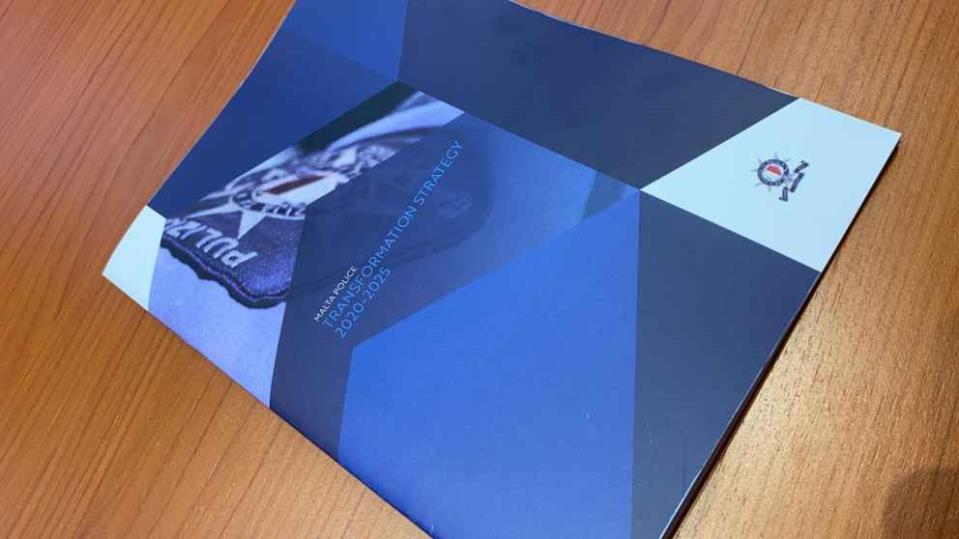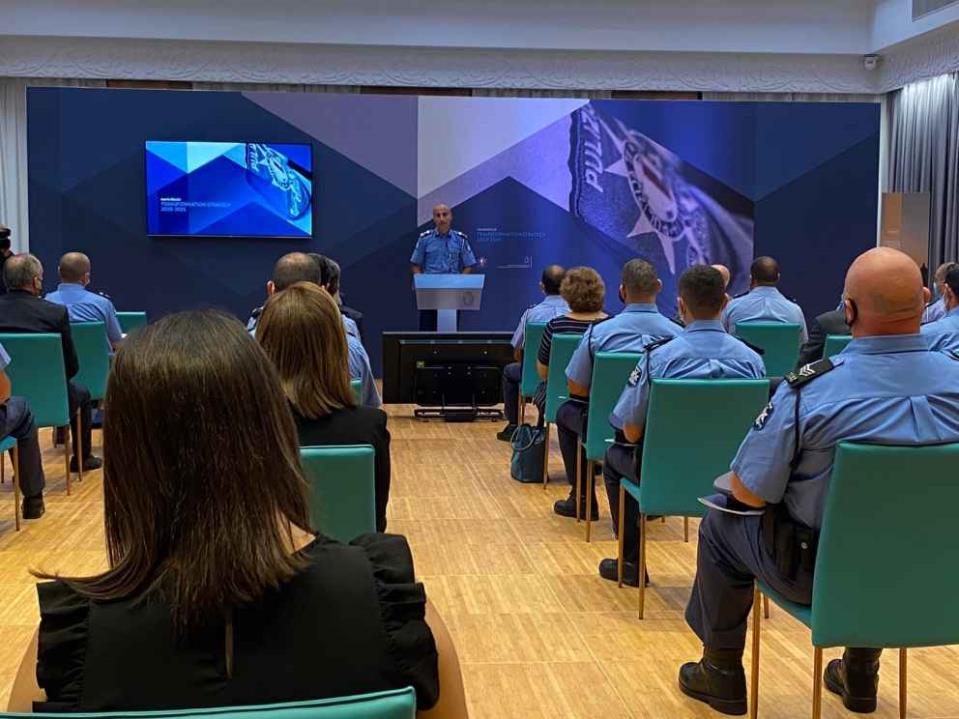The Malta Police Force has launched its transformation strategy for the years 2020 – 2025.
The document titled ‘Malta Police Transformation Strategy 2020 – 2025’ will include a number of aims, including making the force more flexible, measures to combat internal corruption and more.
Three strategic documents were completed in the recent past in 1997, 2009 and 2004. All failed due to the lack of implementation of recommendations, and no monitoring effected to review why initiatives were stalled or shelved, it was said.
“This document, contrary to the ones in the past, will not just be left as a document, and will be translated into concrete action plans,” Police Commissioner Angelo Gafa guaranteed.
The police looked at the strategic requirements for the Force. A reality check was made, where the Force is facing a rapidly evolving society with new modes of criminality and a real/virtual world dynamic, criminologist Professor Saviour Formosa added.

“This led to a strategic approach, moving from the 2016 scoping document to an operational transformation,” they said.
“The aims are the modernisation of the Force, the restructuring of functions, a knowledge-based approach and skilled workforce, and a societal embrace that is in conjunction with society, for society and by society,” Formosa said, mentioning community policing as an example of the latter.
The Strategy’s mission is to provide a professional and trusted policing service to ensure safety and security in partnership with the community.
The strategy has three desired outcomes. The first is “increased trust, confidence, legitimacy and responsiveness externally from the perspective of the community, and internally from that of police officers and staff.”

The second is the “transformation of the current police organisation into a flexible, efficient, data-driven, community centric, outcome focused and modern Police Force.”
Lastly, is “innovation and sustainment of the positive changes resulting from reform through leadership and management practices that are both effective and efficient.”
Eleven strategic objectives have been identified on the basis of the three desired outcomes. These are:
1) To communicate with the public in a clear, consistent and transparent manner. This would be done through holding frequent and open consultation with public interest bodies, holding periodic press briefings, listening to feedback from the public about the service by the police etc.
2) Holding itself accountable at all times. This would be done by drawing up internal performance targets, publishing key indicators on the performance of the Force and implementing operational internal audit and quality control measures.
3) Strengthening anti-corruption measures and safeguards. This would be achieved through continuous screening of police officers, offering adequate protection to whistleblowers (The Commissioner mentioned anonymous report systems as an example), and conducting regular drug testing of personnel.
4) Putting data and technology at the centre of the operation. This would be done by deploying a new integrated case management solution, introducing a workflow management tool and introducing a human resources management system, among others.
5) Redirecting focus of Malta’s police officers to where it matters most. This would be done by drawing up an operational policing strategy that is adaptable and tisk-based, engaging with external communities and agencies to redistribute some work currently done by the Force, maximising the use of civilians where this is needed and relevant, and outsourcing administrative services to allow the Malta Police to focus on policing.
6) Having a workforce with the right size and shape. This will be by restructuring, creating and closing units and clearly defining the remits and objectives of each unit, consolidating the top management structure and optimising the span of control and review the suitability of all ranks, among other things.
7) Having the right capabilities at all levels of the organisation. This would be done through the development of a formal competency framework and skills and capabilities matric, expanding exchange programmes with other police organisations round the world, developing a skills gaps analysis and training-needs analysis, implementing a new police constable training system among other things.
8) Improving the quality of life of staff. This would be done by enhancing family-friendly measures, and enhancing the planning of shift schedules, focusing on mental health and a renewed focus on physical fitness and officer wellbeing for example. The Commissioner, on this last point, said “I want a Force where physical fitness is not lost after recruitment. The level of physical fitness needs to be sustained over the years and we need to see how to do that.”
9) Making the Malta Police Force and employer of choice. This would be done by, among other things, the Force becoming more inclusive through a review of the entry criteria, designing and offering a promising and rewarding career path, introducing measures to increase the level of pride when working in the Force.
10) Creating a leadership and management framework to implement and sustain the transformation. This would be done by being accountable to an external governance board for oversight, developing and implementing leadership development programmes and more.
11) Implementing HR practices that reward the behaviours and attributes that are important to the police. This would include establishing a set of values and translating them into behaviours that are needed, taking a hard stand on discipline, introducing policies and procedures regarding internal placement and mobility and others.

The Police Commissioner said that the implementation of the strategy will be under scrutiny by the Board of Governors. “Contrary to other past reports that were imposed on the Force, we own this document. We asked for it.”
He said the Police Force went for EU funding for the strategy, to send a message that “we want to reform and adapt to a constantly changing environment.” He said that this will add a level of European Commission scrutiny. PWC Also helped the Force create the strategy as part of the EU funds agreement, and the Commissioner said that PWC had former British officers who helped out.
Home Affairs Minister Byron Camilleri said the strategy is modern, but respects the history of the Force.
Over the past months, he said, he spoke many a time regarding the change he wants to see in the Force. “We had a number of occasions where we spoke about initiatives and the change we want to see. A number of the initiatives, even those present in the strategy, have already begun to be implemented.”
Camilleri said that the thirst for change is there. “We made a conscious decision. We did not keep the document to ourselves, but came here today before the people as we want something specific, for the Force to be held accountable for the implementation of this strategy.”
He said he has an obligation to push forward the change that is needed, while stressing the importance of the Force in the country.
Camilleri said that to push change forward, one needs courage. Change is a fear for some, the minister said, “a fear when there should be no reason to fear it.”
The strategy represents the vision and philosophy that the Force is adopting today, the minister added.
He mentioned trust as being a centre issue, and the police being close to the people. “It would be useless making many plans or drawing up documents if people do not feel safe in their homes or feel the presence of the police in their community.”
“We also want a Force that communicates.” He said that the Force must not only communicate with journalists, but with the community in towns and villages, with voluntary organisations and local councils etc. “Through this cooperation, the Force could receive information which it can use in its duties.”
He spoke about having a Force which works according to scientific evidence, and not just on what someone says.
He said he will enter into discussions with ministries for certain work done by the Police today, would be able to start being handled by other entities.
“I want to see a Force that is built on structures, and not on individuals.”